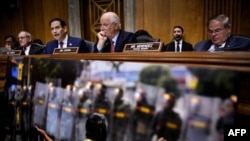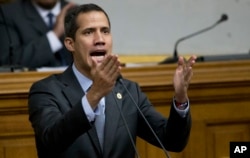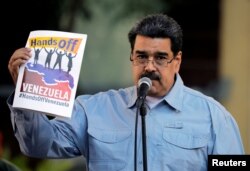U.S. senators on Thursday delivered a message of hope and solidarity to the Venezuelan people and a sharp warning to those backing embattled leader Nicholas Maduro both inside the collapsing South American country and in the broader international community.
"To those in Venezuela: Your fight for freedom and restoration of democracy is our fight, and the free world has not and will not forget you," said Sen. Marco Rubio of Florida, the Republican chairman of the Senate Foreign Relations Subcommittee on the Western Hemisphere. "We [the United States] will be [focused] on this as long as it takes."
The full committee's top Democrat, Sen. Bob Menendez of New Jersey, had blunt words for loyalists of Maduro's socialist regime in Caracas.
"If you want a future in Venezuela, and if you want a future free of U.S. sanctions that will follow you anywhere in the world, then you must recognize the legitimate interim president, Juan Guaido, and you must not have blood on your hands," he said, then paused and repeated: "You must not have blood on your hands."
As for Cuba, Russia and other nations backing Maduro, Menendez added, "Whatever investments you made in Maduro, you're not going to get them back under a failed state. Your own interest is in allowing a democratic process to take place that can restore Venezuela to its full vitality."
The Trump administration's special representative for Venezuela, Elliot Abrams, also had a message aimed far beyond Washington.
"For those members of the [Venezuelan] armed forces who are still on the fence, fearing retaliation by Maduro's Cuban accomplices, we are asking them to show their pride and patriotism, and we believe they have a key role to play in rebuilding their homeland [in a post-Maduro Venezuela]," Abrams told the panel.
Rubio noted the oil-rich country's economic disintegration, accompanied by extreme hunger and privation as well as the exodus of millions of Venezuelans to neighboring countries, calling the situation "a regional catastrophe of epic proportions" and "a cataclysmic crisis."
With international aid shipments blocked at ports of entry by Maduro's army, Rubio predicted, "Venezuela is going to enter a period of suffering no nation in our hemisphere has confronted in modern history."
For his part, Maduro has blamed the United States for Venezuela's woes and has rejected U.S. efforts to send aid to his struggling country as a tactic to further weaken his hold on Venezuela. More than 50 nations have joined the United States in recognizing Guaido as interim leader.
Given the severity of the situation, several lawmakers pressed the Trump administration to accept Venezuelans who flee to the United States, urging they be granted Temporary Protected Status that would shield them from deportation.
"We are judged not only by our words but also by our actions, and we know there are Venezuelans coming to our border," said Sen. Ben Cardin, a Maryland Democrat.
Abrams responded, "We have this policy [for Venezuelan arrivals] under review right now."
Cardin was quick to signal he was not satisfied.
"What's there to review?" the senator asked. "This is not a matter that can wait. … When you say this is under consideration, that tells me we are not acting in a timely way. And that presents, to me, a challenge for us in our leadership in that region."
Abrams promised to relay Cardin's message within the administration.
In his opening remarks, Rubio said the Venezuelan crisis presents a challenge to the United States on many fronts, including national security.
Democrats did not dispute the assertion, but stressed they do not back U.S. military intervention in Venezuela.
"The support that we have lent unequivocally on Venezuela does not include the use of force," Menendez said. "Confronting tyranny requires sustained commitment. But Maduro is not invincible. He's far from it."






